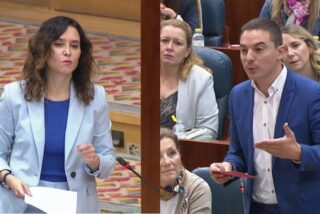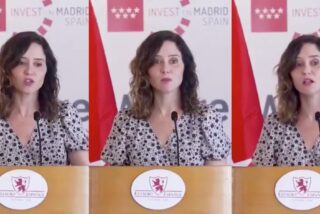Podemos es un partido de la crisis, más que una expresión de la crisis de los partidos
No hay que ser un lince para llegar a semejantes conclusiones, pero cobra importancia que el análisis llegue del influyente semanario británico, considerado una especie de ‘biblia laica’ por muchos intelectuales europeos ( Santiago González: «Ninguno salvará al PSOE del naufragio, pero Pedro garantiza mayor velocidad en el hundimiento»).
The Economist señala en su último número, publicado este sábado 20 de mayo de 2017, que los socialistas españoles, «amenazados» por Podemos, se encuentran «cerca de deshacerse».
En un artículo sobre la fractura de la izquierda española titulado «Cracking under pressure» y que ve la luz justo la víspera de que los atribulados socialistas españoles celebren primarias para elegir secretario general, la revista inglesa aborda los perfiles de Susana Díaz, a la que define como una oradora al estilo tradicional que puede unir al PSOE, y de Pedro Sánchez, al que considera el «más intransigente de los dos» y que apela a las bases.
El exlehendakari Patxi López no es citado en el artículo.
The Economist recoge el análisis de Manuel Arias, politólogo de la Universidad de Málaga, quien afirma que «la izquierda española se está partiendo en dos sociológicamente e ideológicamente», con Podemos como telón de fondo.
Arias añade: «Podemos es un partido de la crisis, más que una expresión de la crisis de los partidos«.
Lo que, a juicio del semanario británico, puede ser una oportunidad para los socialistas si consiguen resolver su batalla interna.
La revista opina que la diferencia entre ambas fuerzas políticas es «el sentido de responsabilidad del PSOE hacia la restaurada democracia española» frente al «desprecio» de Podemos hacia todo ello.
«Guerra de trincheras»
En cualquier caso, la publicación considera que determinar un liderazgo en la izquierda «llevará varios años de política de guerra de trincheras» entre el PSOE y Podemos.
Añade que la «pelea interna amarga» en la que se encuentra en este momento el socialismo español no solo afecta al liderazgo de la izquierda, sino que puede determinar si el Gobierno en minoría del PP con Mariano Rajoy como presidente será el último.
Arias indica que la principal tarea del PSOE es «aceptar que está en una situación difícil y actuar con paciencia» y para ello se requiere de un «líder joven que entusiasme a las bases y cree una ideología post-crisis».
The Economist no cree que Díaz ni Sánchez piensen en esta cuestión y añade que si Sánchez gana, el presidente Mariano Rajoy podría convocar elecciones anticipadas para mejorar su ventaja, y si gana Díaz, tendrá que unir al partido, pero en cualquier caso,»el claro vencedor» de las divisiones en la izquierda es el centro-derecha.
—
Left v far left
Spain’s Socialist primary is a battle for the left’s future
The party faithful are under pressure from Podemos, and divided among themselves

ON THE morning of May 7th about 300 members of Spain’s Socialist Workers’ Party (PSOE) gathered in a conference hall on the site of Zaragoza’s international exhibition of 2008, across the river Ebro from the city centre. The bleak expo park with its abandoned cable car has seen better days. So has the PSOE. The party faithful were gathered to listen to Susana Díaz (pictured), the narrow favourite in a primary to elect the Socialists’ leader on May 21st. Her message, delivered in an Andalucian accent and the crescendos of an old-fashioned tub-thumper, was that she alone could unite her party “so that the PSOE becomes an alternative government again”.
That will be no small task. After governing Spain for 22 of the 29 years to 2011, the Socialists have lost the past three general elections. Unlucky enough to find themselves in power, under José Luis Rodríguez Zapatero, when Spain’s housing and credit bubble burst in 2008, they were obliged to take unpopular measures. Since then, the PSOE has lost almost half its voters to the upstarts of Podemos, a far-left party formed out of the anti-austerity protest movement known as the indignados.
The Socialists now face a bitter internal feud. Its outcome will not just affect the battle for supremacy on the Spanish left; it may determine whether or not the minority government of Mariano Rajoy and his conservative People’s Party (PP) will last.
Ms Díaz is only 42, yet as the president of the regional government in Andalucía, the Socialists’ last great bastion, she represents the party establishment and its traditional working-class base (her father is a plumber). She was once expected to win easily: she has the backing of nearly all the party’s grandees. Her chief opponent is the PSOE’s previous leader, Pedro Sánchez, who was ousted in October. He has mounted a strong bid to reclaim his job by appealing to rank-and-file members.
Party of crisis
The puzzle for the Socialists is how to regenerate themselves in the shadow of Podemos. The new radical party has won over middle-class young people in the big cities, whose expectations of ease and prosperity were dashed by the financial crisis. Apart from its bitterness at Mr Zapatero’s economic squeeze, this generation thinks the PSOE has become too comfortable with power. “The Spanish left is split in two sociologically and ideologically,” says Manuel Arias Maldonado, a political scientist at the University of Málaga.
“Social democracy in the 21st century means a very competitive economy and very redistributive public spending,” says Ignacio Urquizu, a PSOE deputy who supports Ms Díaz. Some in Podemos, by contrast, want an indiscriminate spending binge and a European version of the Kirchners’ Argentina. Nevertheless, many people in both parties are struggling to define a new social contract for a globalised economy. More than policy, what differentiates them is the PSOE’s sense of responsibility towards Spain’s restored democracy and Podemos’s populist contempt for it.
“The rational thing would be an agreement between the two forces,” notes Xavier Domenèch, who leads the Catalan affiliate of Podemos. But “underlying tensions” prevent this, he adds. It may take several years of political trench warfare to determine which is the senior partner. Demography helps Podemos: the audience for Ms Díaz in Zaragoza was mainly middle-aged or older. “I think we are in a new world,” says Mr Domenèch. “The economic crisis has put in question institutions that were very worn-out,” including the PSOE.
The insurgents argue that a more radical left can win disillusioned voters over, but they have little evidence. At the last election, in June 2016, Pablo Iglesias, Podemos’s leader, allied his party with the United Left, the former Communist Party. The alliance secured 1.1m fewer votes than its constituent parts had managed in the election the previous December, and failed to overtake the PSOE. At a party congress in February, Mr Iglesias sidelined his more moderate deputy, Iñigo Errejón. He seems determined to retreat to the hard left and the politics of permanent protest.
Meanwhile, Spain’s economy has been recovering vigorously (see chart). Though Spaniards are still worried about unemployment and corruption, as the crisis recedes fewer are indignados. “I think Podemos is a party of the crisis, rather than an expression of the crises of parties,” says Mr Arias. That should offer an opportunity to the Socialists—if they can recover from their leadership battle.
Mr Sánchez claims to be further left than Ms Díaz. In his campaign he has gestured both to Catalan nationalism (Spain should recognise that it is a “plurinational” country, he says) and to Podemos (pledging to collaborate with other “progressive forces”). Yet the differences between the two “are not really ideological”, according to a former secretary-general of the party. Indeed, Ms Díaz’s support was decisive in electing Mr Sánchez as the party leader in 2014, running as an economic liberal.
Rather, the battle is over power and over the party’s future identity. In the manner of Jeremy Corbyn, the hard-left leader of Britain’s Labour Party, Mr Sánchez promises to give power over all decisions to the members, while Ms Díaz defends the PSOE’s traditional system of letting elected leaders choose its policies. Mr Sánchez has certainly been the more intransigent of the two: after leading the Socialists to electoral defeat in June 2016, he insisted on opposing Mr Rajoy’s investiture as prime minister. Since that would have triggered a third election in a year, at which the Socialists seemed certain to lose further ground, Ms Díaz and other party barons ousted Mr Sánchez and allowed Mr Rajoy to form a minority government.
Mr Sánchez has campaigned by attacking this decision, saying it makes the PSOE complicit in the PP’s corruption scandals. Ms Díaz replies that it was his leadership that reduced the party to just 85 of the 350 seats in the Cortes (parliament). “Pedro, your problem is you,” she said this week.
Spain’s Socialists are not the only European social-democratic party that is struggling to put a shine back on a tarnished brand. Their counterparts in France and the Netherlands are doing even worse. “The main task for the PSOE is to accept that it’s in a very difficult situation and act with patience,” says Mr Arias. “It needs a young leader who can enthuse the rank-and-file and create a [post-crisis] ideology.” Neither of the main contenders in the primary fits that bill. If Mr Sánchez wins, Mr Rajoy may engineer a fresh election to press his advantage. Even if Ms Díaz triumphs, she faces a battle to put the party back together again. Either way, as elsewhere in Europe, the clear winner from the left’s divisions and introspection is the centre-right.













































